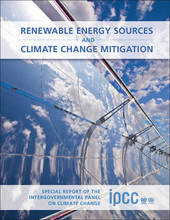
|
Renewable Energy Sources and Climate Change Mitigation: Special Report of the Intergovernmental Panel on Climate Change
Hardback
Main Details
| Title |
Renewable Energy Sources and Climate Change Mitigation: Special Report of the Intergovernmental Panel on Climate Change
|
| Authors and Contributors |
Edited by Ottmar Edenhofer
|
|
Edited by Ramon Pichs-Madruga
|
|
Edited by Youba Sokona
|
|
Edited by Kristin Seyboth
|
|
Edited by Susanne Kadner
|
| Physical Properties |
| Format:Hardback | | Pages:1084 | | Dimensions(mm): Height 286,Width 223 |
|
| Category/Genre | Global warming
Alternative and renewable energy sources and technology |
|---|
| ISBN/Barcode |
9781107023406
|
| Classifications | Dewey:333.794 |
|---|
| Audience | | Tertiary Education (US: College) | |
|---|
| Illustrations |
500 Plates, color
|
|
Publishing Details |
| Publisher |
Cambridge University Press
|
| Imprint |
Cambridge University Press
|
| Publication Date |
28 November 2011 |
| Publication Country |
United Kingdom
|
Description
This Intergovernmental Panel on Climate Change Special Report (IPCC-SRREN) assesses the potential role of renewable energy in the mitigation of climate change. It covers the six most important renewable energy sources - bioenergy, solar, geothermal, hydropower, ocean and wind energy - as well as their integration into present and future energy systems. It considers the environmental and social consequences associated with the deployment of these technologies and presents strategies to overcome technical as well as non-technical obstacles to their application and diffusion. SRREN brings a broad spectrum of technology-specific experts together with scientists studying energy systems as a whole. Prepared following strict IPCC procedures, it presents an impartial assessment of the current state of knowledge: it is policy relevant but not policy prescriptive. SRREN is an invaluable assessment of the potential role of renewable energy for the mitigation of climate change for policymakers, the private sector and academic researchers.
Reviews'The IPCC has provided us with a well-researched, carefully-presented assessment of the costs, risks and opportunities of renewable energy sources. It provides a systematic analysis and scientific assessment of the current knowledge about one of the most promising options to cut emissions of greenhouse gases and to mitigate climate change.' Lord Nicholas Stern, IG Patel Professor of Economics and Government, London School of Economics and Political Science 'The mitigation of climate change is one of the major challenges of the 21st century. The transition of our global energy system to one that supports a high share of renewable energy could be an integral part of humankind's answer to this challenge. This report provides important groundwork for such a transition.' Hartmut Grassl, Former Director of the World Climate Research Programme, Max Planck Institute for Meteorology 'This report is a comprehensive and authoritative contribution to the debate about whether renewable energy can solve the climate problem in an economically attractive fashion. It's a blueprint for further development of the renewables sector and sets out clearly its role in climate change mitigation.' Geoffrey Heal, Columbia Business School, Columbia University 'Renewable energy resources and the technologies to expand their use provide the key energy source to address multiple challenges of national and global sustainability for all. This report is invaluable for the 21st Century.' Thomas B. Johansson, Lund University, Sweden 'Renewable energy can drive global sustainable development. This Special Report comes at the right time and offers insights and guidance to strongly facilitate the change of our industrial metabolism.' Klaus Toepfer, Institute for Advanced Sustainability Studies, Potsdam 'There may be a number of ways to achieve a low-carbon economy, but no pathway has been as thoroughly and comprehensively explored as the range of possible contributions of renewable energy sources towards achieving that goal contained in this IPCC Special Report.' John P. Weyant, Stanford University
|